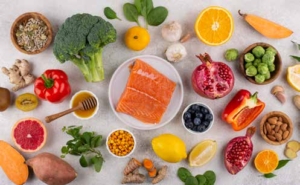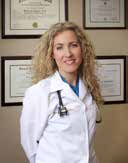Clean Eating A functional Medical Doctor’s Perspective by Svetlana Kogan, M.D.
 In the last issue we talked about toxic chemicals making their way into the food we eat and today we will be going over useful tips on how to avoid being exposed to unwanted menace. Eating clean, organic food and preparing it in a healthy manner is truly a beacon of hope for those seeking a balanced and nourishing lifestyle.
In the last issue we talked about toxic chemicals making their way into the food we eat and today we will be going over useful tips on how to avoid being exposed to unwanted menace. Eating clean, organic food and preparing it in a healthy manner is truly a beacon of hope for those seeking a balanced and nourishing lifestyle.
As a functional physician I always recommend that my patients eat whole, unprocessed foods encompassing an array of all colors – red, green, blue/purple, orange, white, brown, and yellow. This way we will benefit from the phytonutrients contained in the produce and they are wonderful antioxidants which help us with balancing all our organ systems. To avoid the pesticide/ herbicide load in the produce, let’s look at the recommendations from the environmental working group – EWG for this year.
They have identified produce with the highest content of chemical exposure and residue – a so-called Dirty Dozen – and I recommend that you try to buy these organic:
- Strawberries
- Spinach
- Kale, Collard and Mustard Greens
- Peaches
- Pears
- Nectarines
- Apples
- Grapes
- Bell and Hot Peppers
- Cherries
- Blueberries
- Green Beans
EWG has also identified the so-called Clean Fifteen –a group of produce that has had the least chemical exposure. If you are unable to buy all organic, these would be the foods that do not require as much vigilance at this time, and not organic would suffice:
- Avocados
- Sweet Corn
- Pineapples
- Onions
- Papaya
- Sweet Peas (frozen)
- Asparagus
- Honeydew Melon
- Kiwi
- Cabbage
- Mushrooms
- Mangoes
- Sweet Potatoes
- Watermelon
- Carrots
The above lists are updated yearly so check out EWG website and apps for updated info.
Whatever produce you bring home, rinse it before use with a reputable vegetable cleaner or simply mix clean warm water with baking soda or white vinegar (in a ratio of 1 part vinegar to 4 parts
water), soak, and mildly agitate produce for 5 minutes, and then rinse with clean water. Sea salt can also be used as an abrasive agent to clean the skin of produce.
Cooking clean is important too. I recommend steaming, baking, and broiling foods rather than frying or grilling at high heat. But even if you are “stuck” with grilling, there are some tricks to lessen the biochemical damage to the food which grilling process induces: Trimming excess fat off meat and removing the skin off chicken and fish before grilling can reduce the total concentration of chemicals in grilled animal foods.
The application of oregano, rosemary, and black pepper during cooking may help with limiting of some of the toxic chemicals induced by grilling.
Avoid using plastic utensils or storage containers, as they may be filled with undisclosed chemicals which can leach into the food. The safest choices for food storage are glass and stainless-steel containers.
As far as my beloved seafood, even though almost all seafood contains pollutants in varying amounts, there are tricks to minimize the exposure to mercury, PCBs, and microplastics:
Avoid eating very large fish, like tuna, swordfish, tilefish, shark, and mahi mahi, as they have the highest concentration of mercury. By cutting away the skin before cooking fish and by steaming,
broiling, or baking it (as opposed to grilling or frying) – exposure to these chemicals can be reduced.
Avoid farm-raised fish, as it contains large amounts of harmful contaminants due to the feed used in raising them. According to testing by independent groups, farmed salmon contains 5-10 times the PCB level of wild salmon. So, choose fish that are wild caught.
Being mindful and eating clean is more than a culinary choice; it’s a way of life that promotes well-being and environmental sustainability. It’s about making informed decisions, connecting
with nature, and nurturing your body with the best that the Earth has to offer. So, the next time you’re in the kitchen, think of it as an opportunity to create a masterpiece of health and flavor, one healthy ingredient at a time. Your body will thank you for it.
The author of ‘Diet Slave No More!’, Svetlana Kogan, MD is a Board-Certified Internal Medicine, Holistic & Functional Medical Doctor with 25 years of experience. Her website is CustomLongevity.com Office Phone: 239-676-6883




Leave a Reply
Want to join the discussion?Feel free to contribute!